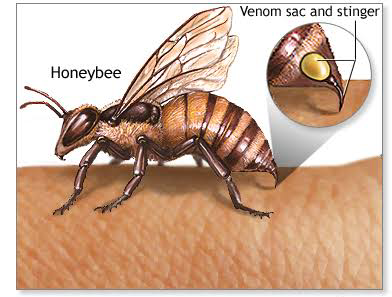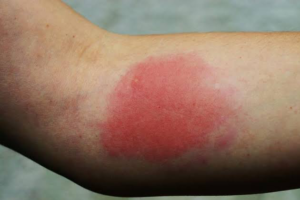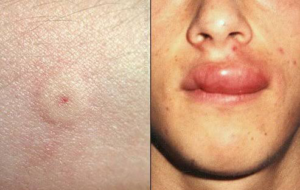
Bee the insect that make honey uses stinging as a means of defence mechanism. It also makes venom, which is the poison that makes bee sting painful.
Bee venom may also be used as medicine, where it is given as a shot for bee sting allergy. It is also used for osteoarthritis, Parkinson disease, multiple sclerosis (MS), nerve pain, and other conditions, but there is no good scientific evidence to support these uses.
What is Bee Sting Allergy?

The effect of bee sting is not the same for everyone. For most people, a bee sting only produces temporary pain and irritation at the site of the sting. For others, bee stings cause an allergic reaction that can range from mild to severe. In extreme cases, a bee sting can cause life-threatening anaphylaxis.
Majority of those that react to bee stings, will experience a mild to moderate irritant reaction in the form of localized redness and swelling. The remaining percentage, the allergic reaction can be much more severe, requiring emergency medical treatment. Fatal reactions are rare.
As bad as bee stings may be, it is the bee that gets the raw end of the deal since it dies few minutes after the sting.
What are the Symptoms of being Stung by a Bee?

Just as I mentioned earlier, that bee stings can lead to possible allergic reactions. It is worthy to note that the symptoms below are due to an allergic reaction, and not venom.
Also bee sting share similar symptoms with wasp, hornet, or yellow jacket sting in different parts of the body.
Eyes, Ear, Nose and Throat
- Swelling in the throat, lips, tongue, and mouth
- Tightness or swelling of the throat
Heart and Blood Vessels
- Rapid heart rate
- Severe decrease in blood pressure
- Collapse or heart failure
Lungs and Nose
- Difficulty breathing
Skin
- Hives
- Itching
- Swelling and pain at site of the sting
- Redness
Stomach and Intestine
- Abdominal cramping
- Diarrhea
- Nausea and vomiting
How do you tell if you are allergic to bee sting?
Allergies are generally hereditary, so an allergic parent should be more cautious with her child, although children will often outgrow their allergy. If a severe reaction occurs, an allergist should be seen as soon as possible. Future stings could result in reactions that are up to 60 percent worse than the first allergic reaction. Testing for bee sting allergies before a serious reaction has occurred is unnecessary.
How is Bee Sting Treated?
The treatment depends mainly on severity of the allergic reaction.
- Remove the stinger as soon as possible, taking care to avoid squeezing the venom sac. When this sac is squeezed or broken, more venom will be released.
- Clean the area with soap and water.
- Use a cold compress, apply steroid ointments, and take antihistamines to help reduce itchiness and inflammation.
Treatment of severe systemic reactions requires an urgent shot of epinephrine, which will help to reduce the severity of the allergic reaction. Doctors may also administer oxygen and intravenous fluids.
Long-term treatment
Desensitization immunotherapy is a treatment designed to reduce a person’s sensitivity to particular allergens. Someone who has had a severe allergic reaction to bee stings, or has other risk factors, can receive a form of this treatment known as venom immunotherapy (VIT).






Leave a Reply